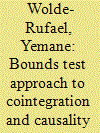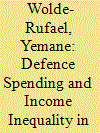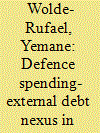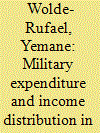| Srl | Item |
| 1 |
ID:
093470


|
|
|
|
|
| Publication |
2010.
|
| Summary/Abstract |
This paper attempts to examine the dynamic relationship between economic growth, nuclear energy consumption, labor and capital for India for the period 1969-2006. Applying the bounds test approach to cointegration developed by Pesaran et al. (2001)we find that there was a short- and a long-run relationship between nuclear energy consumption and economic growth. Using four long-run estimators we also found that nuclear energy consumption has a positive and a statistically significant impact on India's economic growth. Further, applying the Toda and Yamamoto (1995)approach to Granger causality and the variance decomposition approach developed by Pesaran and Shin (1998) we found a positive and a significant uni-directional causality running from nuclear energy consumption to economic growth without feedback. This implies that economic growth in India is dependent on nuclear energy consumption where a decrease in nuclear energy consumption may lead to a decrease in real income. For a fast growing energy-dependent economy this may have far-reaching implications for economic growth. India's economic growth can be frustrated if energy conservation measures are undertaken without due regard to the negative impact they have on economic growth.
|
|
|
|
|
|
|
|
|
|
|
|
|
|
|
|
| 2 |
ID:
140831


|
|
|
|
|
| Summary/Abstract |
We revisit the causal relationship between military spending and unemployment in the G7 countries applying a bootstrap panel causality analysis that accounts for both cross-sectional dependence and for heterogeneity across countries. Using per capita real GDP as a controlled variable, we found a unidirectional causality running from military spending to unemployment for Canada, Japan, and the US, one-way causality running from unemployment to military spending for France and Germany, and bidirectional causality for Italy and the UK. The empirical evidence does not seem to provide consistent results regarding the causal relationship between military spending and unemployment in G7 countries.
|
|
|
|
|
|
|
|
|
|
|
|
|
|
|
|
| 3 |
ID:
096121


|
|
|
|
|
| Publication |
2010.
|
| Summary/Abstract |
This study explores the causal relationship between carbon dioxide (CO2) emissions, renewable and nuclear energy consumption and real GDP for the US for the period 1960-2007. Using a modified version of the Granger causality test, we found a unidirectional causality running from nuclear energy consumption to CO2 emissions without feedback but no causality running from renewable energy to CO2 emissions. The econometric evidence seems to suggest that nuclear energy consumption can help to mitigate CO2 emissions, but so far, renewable energy consumption has not reached a level where it can make a significant contribution to emissions reduction.
|
|
|
|
|
|
|
|
|
|
|
|
|
|
|
|
| 4 |
ID:
147497


|
|
|
|
|
| Summary/Abstract |
The rising trend in income inequality has recently attracted a renewed interest in the determinants of this growing trend across many countries. This article adds to the debate by investigating the impact of defence expenditure as a possible determinant of inequality in Taiwan, a country once was considered to be a poster child of an equitable growth, but now income inequality has become one of the Taiwan’s growing challenges. Applying the bounds test approach to cointegration and four long-run estimators for the period from 1976–2011, we found a long-run relationship between the various measures of inequality and defence expenditure where defence expenditure exerts a positive and a statistically significant impact on the worse income inequality in Taiwan. Further application of the lag-augmented causality test procedure also reveals a unidirectional causality running from defence expenditure to income inequality with defence expenditure causing income inequality to rise.
|
|
|
|
|
|
|
|
|
|
|
|
|
|
|
|
| 5 |
ID:
091728


|
|
|
| 6 |
ID:
144791


|
|
|
|
|
| Summary/Abstract |
This paper attempts to investigate the long-run and the causal relationship between military expenditure and income distribution in South Korea for the period 1965–2011. Applying the bounds test approach to cointegration, we found a long-run relationship between military expenditure and the Gini coefficient with military expenditure having a positive and a statistically significant impact on income inequality. A 1% rise in military expenditure increased the Gini coefficient by 0.38%. Application of the lag-augmented causality test also reveals a unidirectional causality running from military expenditure to income inequality. The evidence seems to suggest that devoting more resources to the military sector may further worsen income inequality in South Korea.
|
|
|
|
|
|
|
|
|
|
|
|
|
|
|
|
| 7 |
ID:
139215


|
|
|
|
|
| Summary/Abstract |
This study revisits the causal relationship between military spending and economic growth in 10 Middle East countries via a panel causality analysis that accounts for cross-sectional dependence and heterogeneity across countries. Our results indicate unidirectional causality from military spending to growth for Turkey; one-way causality from economic growth to military spending for Egypt, Kuwait, Lebanon, and Syria; bidirectional causality for Israel; and no causality in either direction for Jordan, Oman, and Saudi Arabia. The empirical evidence does not provide consistent results regarding the causal relationship between defense expenditure and economic growth in these countries.
|
|
|
|
|
|
|
|
|
|
|
|
|
|
|
|